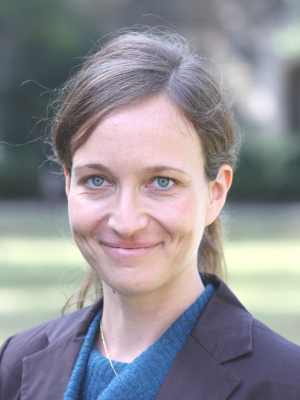Catherine Herfeld’s work is rooted in philosophy and economics. Now, one can throw history into the mix. As a fellow at the HOPE Center, Catherine has spent the past five months engaged with historians of economics, and her encounter with history, she says, is opening up her work to new approaches.
Debates in the philosophy of economics are often abstract, far away from actual economic practices, says Catherine, who just this past fall submitted her dissertation on the emergence and philosophical foundations of rational choice theory. But a historical approach to economics could enrich those debates. “Taking history as a data base, as it were, I can see how theories and models emerged in a particular context, and that can be enriching for a philosopher.”
During her time at the Center, Catherine has been investigating how the formal version of modern rational choice theory was developed. As she explains, beginning in the 1930s, there was a shift in the economist’s object of investigation and the problems that economists sought to solve: the individual agent and his choices were assigned a central part in economics. But why did analyzing and formally representing individual choice become such a crucial endeavor in twentieth-century economics? Catherine hopes to provide a historical narrative of postwar practice with reference to that shift.
Her research has benefited greatly from the archival materials in the Economists’ Papers Project. Letters, lecture notes, diary entries, and the like reveal how theories of rational choice emerged from certain intellectual traditions and from the philosophical issues with which economists were engaged. “Archives let you see and understand that context. You know that in an abstract way, but when you see the archival evidence, you can really see how context and philosophical predilections helped shape and justify a theory,” Catherine says.
In order to further substantiate the main theses of her dissertation, she has been examining in particular the papers of Oskar Morgenstern and Kenneth Arrow.
Catherine has also been inspired by the different ways the HOPE faculty approach history. The biographical approach of Roy Weintraub and Bruce Caldwell, the philosophical approach of Kevin Hoover—there’s room for them all at the Center, and for a young scholar, seeing that kind of eclecticism is exciting.
Now that she has submitted her dissertation, Catherine is enjoying the more relaxed and informal interactions with faculty and other fellows at the HOPE Center. It’s the small setting of the Center, she says, that encourages the kind of spontaneous and low-stakes conversations and exchanges that can lead to new ideas and ways of pursuing one’s subject.
“Young scholars often cannot engage directly with professors on such a scale as we can here, and when we do, it is often in a formal setting, like a dissertation defense. Here at Duke, you can bounce ideas off them, try ideas out, and you’ll get feedback, from professors and from the other fellows.”
From here, Catherine’s next stop is the Department of Philosophy at the Ludwig Maximilian University of Munich, where she will spend three years as a postdoctoral fellow.
--Paul Dudenhefer
